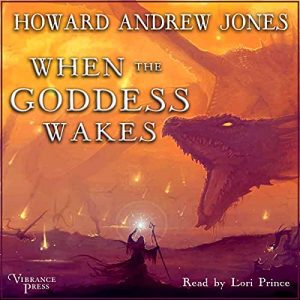 Junkyard War (Shining Smith #3) by Faith Hunter
Junkyard War (Shining Smith #3) by Faith Hunter Narrator: Khristine Hvam
Format: audiobook
Source: purchased from Audible
Formats available: audiobook
Genres: dystopian, post apocalyptic, urban fantasy
Series: Shining Smith #3
Length: 6 hours and 35 minutes
Published by Audible Audio on December 8, 2022
Purchasing Info: Author's Website, Publisher's Website, Amazon
Goodreads
It’s find retribution or die trying in Shining Smith’s ultimate challenge, from the author of the “Jane Yellowrock” and “Soulwood” series.
Shining Smith and her crew have obtained the weapons they need to rescue one of their own from the grips of their mortal enemy, Clarisse Warhammer. But to mount an assault on her fortified bunker, they have to cobble together an army of fighters.
That could be the biggest battle of them all.
Shining will need to step back into the biker world she left behind to broker an uneasy peace, then lead rival factions into a certain death trap. Can Shining take Warhammer down without having to compel more and more people to do her bidding? And will her feline warriors, the junkyard cats, remain loyal and fight alongside her? Or will Shining have to become something and someone she hates, so that vengeance can finally be hers?
My Review:
“Bloody damn!” as Shining Smith would say. Bloody damn this was a wild ride in Shining’s sidecar. I meant brain – although occasionally also sidecar.
Because Shining’s post-climate-apocalypse AND dystopia is run by the biker gangs – or at least Shining’s little corner of it as well as her mental landscape are. Shining herself is famous and infamous – in equal measure – among the Outlaw Militia Warriors as ‘Little Girl’ – one of the first female ‘made men’ in that fiercely misogynistic culture.
When Shining was literally a little girl her daddy sent her inside the carapace of one of the enemy’s giant ‘mamabots’ with a nuke strapped to her back. Those mamabots were crawling, rolling factories of nanobots designed to infect and kill anyone or anything they came across. They were helping the enemy to conquer the West Coast of the U.S. one klick at a time.
Shining expected to die in that bot – and she very nearly did. Instead, she came out changed, infected by the bots’ poison and transformed by her own exceedingly stubborn will into the human equivalent of the mamabot – a queen constantly emitting a poison that turns anyone that touches it into her thrall.
Including the ever-increasing crew at her junkyard. Especially the cats. Her Cats, who have a queen of their own who is probably the person truly running the place.
 But Shining is not the only human queen, because every true hero – especially if that’s not remotely what they want to be – creates their own archenemy – or the other way around. Clarisse Warhammer targeted Shining all the way back in Junkyard Cats, sending the dead body of her best friend back to her junkyard in the trunk of a rusted out car.
But Shining is not the only human queen, because every true hero – especially if that’s not remotely what they want to be – creates their own archenemy – or the other way around. Clarisse Warhammer targeted Shining all the way back in Junkyard Cats, sending the dead body of her best friend back to her junkyard in the trunk of a rusted out car.
Shining has been gunning for Clarisse ever since.
Junkyard War is the final showdown between Shining and Warhammer, the culmination of every single thing that’s happened since the opening of Junkyard Cats. Shining has pulled every string, coaxed every friend, bribed every enemy she has in order to bring enough firepower to bear to have the best chance possible of crawling out alive after sending herself into the lair of someone much worse than that first mamabot.
This time she doesn’t even have a nuke. What she has this time is better. She has friends. And, more importantly, particularly from their point of view, she has the Cats.
Escape Rating A+: I picked up the audio of the first book in the Shining Smith series, Junkyard Cats, three years ago when the audio was all there was. And did I ever wish there was more.
I got that more in 2021’s Junkyard Bargain, and that still wasn’t enough of Shining Smith, her totally FUBAR’d world, or especially her telepathic battle cats who have probably been running things for a lot longer than Shining either knows or wants to think about.
It’s been a long wait but here we have the climax – sometimes in multiple senses of that word – or Shining’s story in Junkyard War. And I have to say that it has SO been worth the wait.
But it has been a hell of a wait because the three books in the series aren’t so much separate books as they are chapters in a continuing saga that now reads like it has skidded, heart first, into a WOW! of a conclusion.
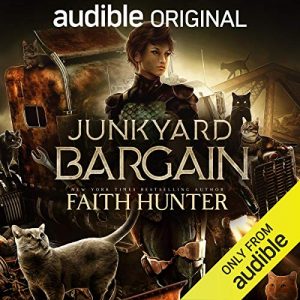 Which means two things. First, the books pile layer upon layer building Shining’s world, so you really need to start at the beginning in Junkyard Cats. Fortunately, the first two stories, Junkyard Cats and Junkyard Bargain are both available as ebooks as well as audio, and they’re fast, compelling reads.
Which means two things. First, the books pile layer upon layer building Shining’s world, so you really need to start at the beginning in Junkyard Cats. Fortunately, the first two stories, Junkyard Cats and Junkyard Bargain are both available as ebooks as well as audio, and they’re fast, compelling reads.
Second, this does feel like an ending, after an edge-of-the-seat thrilling battle that literally plucks at the heart – because the whole series has been told from Shining’s jaded, world-weary, all too often jaundiced and misanthropic point of view. So when she’s directing her friends, her people and the Cats around an ever changing battlefield and worrying over every single one we’re right in there with her, both because Shining’s voice is so singular and wry, and because the narrator who brings her to us, Khristine Hvam, has done a consistently excellent job of embodying Shining through this entire riveting series.
As this story ends, Shining is confronted with something she’s never really had before – the power to choose her own future. There could be new stories in Shining’s world from this point, but they’d be fundamentally different from what came before. So this is at least a break but also quite possibly as close to an HEA as Shining will ever get considering the state of the world she inhabits.
Either way, it’s a wild ride and a total rush and I wouldn’t have missed it for the world.
Whether or not you’ll feel the same way probably relies on whether or not you are able to fall into Shining’s voice because you see everything from inside her head. I loved riding her journey with her but your reading and/or listening mileage may vary. I hope it doesn’t because she’s one hell of a character experiencing a fantastic and utterly absorbing story.

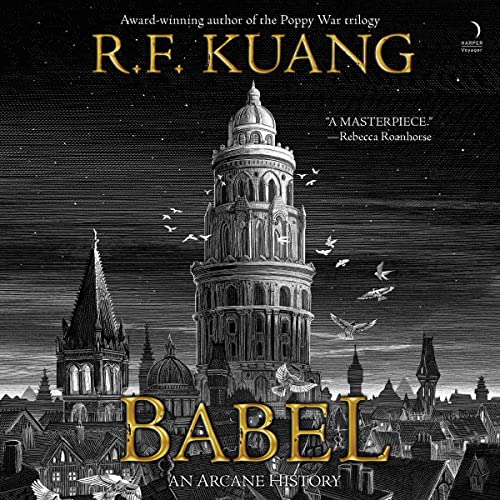 Babel, Or the Necessity of Violence: An Arcane History of the Oxford Translators' Revolution by
Babel, Or the Necessity of Violence: An Arcane History of the Oxford Translators' Revolution by 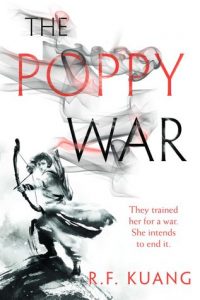 In a work of historical fantasy, particularly one that cleaved so close to this period, those evils would be impossible to ignore and no reader should expect them to be ignored. But Babel is fiction, which means I also went into it expecting a story to be told that would captivate me – and in this particular case captivate me every bit as much as the author’s
In a work of historical fantasy, particularly one that cleaved so close to this period, those evils would be impossible to ignore and no reader should expect them to be ignored. But Babel is fiction, which means I also went into it expecting a story to be told that would captivate me – and in this particular case captivate me every bit as much as the author’s 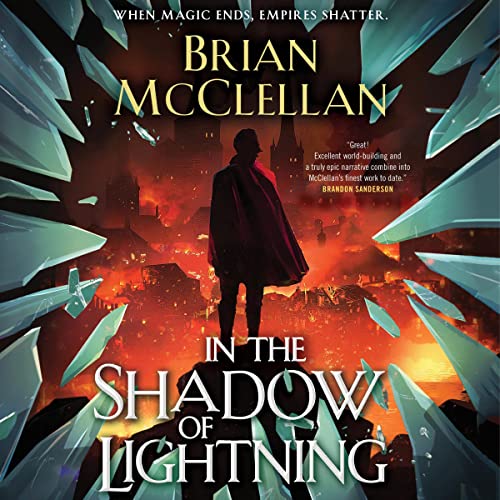 In the Shadow of Lightning (Glass Immortals, #1) by
In the Shadow of Lightning (Glass Immortals, #1) by 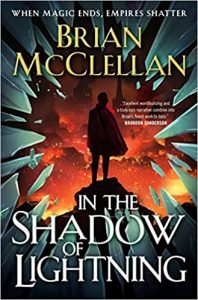 Escape Rating A+: “Glassdamn.” It rolls easily through the mind, or trippingly off the tongue, as though it’s an epithet that we’ve always used – or at least could have if we’d had a mind to. And glassdamnit but this is a terrific story.
Escape Rating A+: “Glassdamn.” It rolls easily through the mind, or trippingly off the tongue, as though it’s an epithet that we’ve always used – or at least could have if we’d had a mind to. And glassdamnit but this is a terrific story.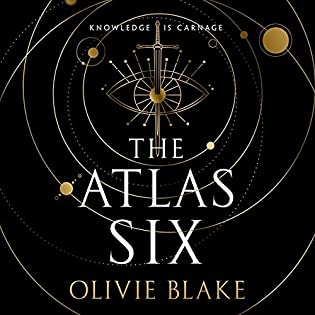 The Atlas Six (The Atlas, #1) by
The Atlas Six (The Atlas, #1) by 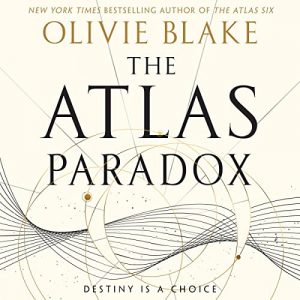 Which admittedly does ramp up the tension VERY dramatically for the second book in the series,
Which admittedly does ramp up the tension VERY dramatically for the second book in the series, 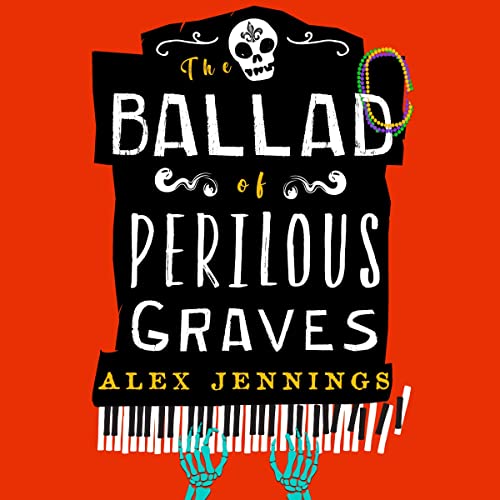 The Ballad of Perilous Graves by
The Ballad of Perilous Graves by 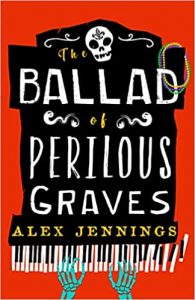 Escape Rating A-: I am a sucker for stories about New Orleans so I was all set to love The Ballad of Perilous Graves. Which in the end I did, although it took awhile to get me there. This is one of those books where the audiobook, as read by Gralen Bryant Banks, carried me over to the point where the story got its hooks into me and didn’t let go.
Escape Rating A-: I am a sucker for stories about New Orleans so I was all set to love The Ballad of Perilous Graves. Which in the end I did, although it took awhile to get me there. This is one of those books where the audiobook, as read by Gralen Bryant Banks, carried me over to the point where the story got its hooks into me and didn’t let go. Riverside: The feel-good, life-affirming story of love, friendship, family and new beginnings by
Riverside: The feel-good, life-affirming story of love, friendship, family and new beginnings by 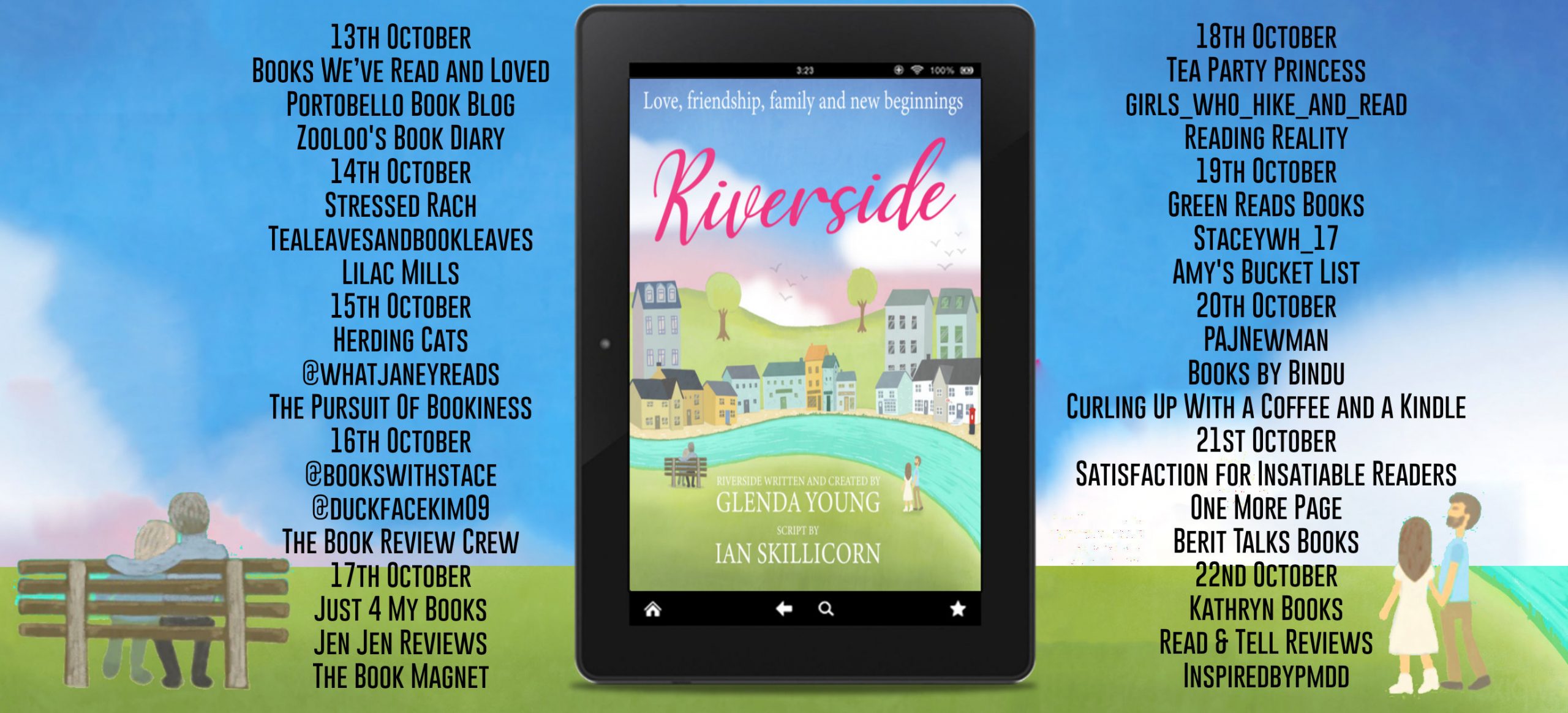
 Travel by Bullet (The Dispatcher #3) by
Travel by Bullet (The Dispatcher #3) by  I’ve always assumed that
I’ve always assumed that 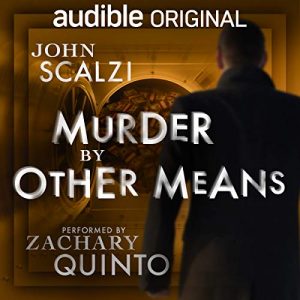 Escape Rating A: The author of The Dispatcher series is best known for two things, his science fiction and his excellent line in snark. Travel by Bullet, and the entire series so far, has a whole lot more of the latter than the former.
Escape Rating A: The author of The Dispatcher series is best known for two things, his science fiction and his excellent line in snark. Travel by Bullet, and the entire series so far, has a whole lot more of the latter than the former. No Man's Land (Star Trek: Picard) by
No Man's Land (Star Trek: Picard) by 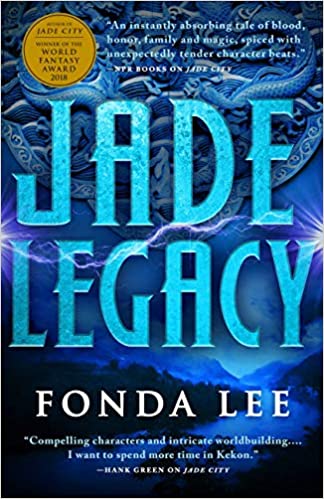 Jade Legacy (The Green Bone Saga, #3) by
Jade Legacy (The Green Bone Saga, #3) by 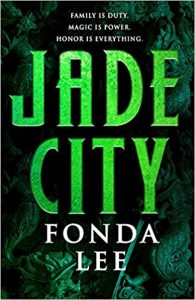 The story that began in
The story that began in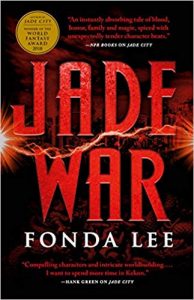 Escape Rating A++: This book, and this entire series, deserve all the stars. I picked this to be the last review of the year because I wanted to finish this year’s reading with a real bang of a winner, and Jade Legacy delivered all the highs and lows I could possibly have ever wanted.
Escape Rating A++: This book, and this entire series, deserve all the stars. I picked this to be the last review of the year because I wanted to finish this year’s reading with a real bang of a winner, and Jade Legacy delivered all the highs and lows I could possibly have ever wanted.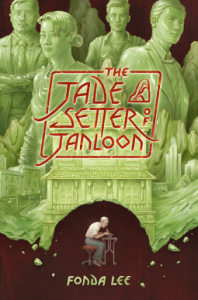 Watching them rise, and fall, and rise again is a journey very worth taking. If you have not yet had the pleasure, start with Jade City and be prepared for a wild, satisfying and heartbreaking ride. I envy you the journey.
Watching them rise, and fall, and rise again is a journey very worth taking. If you have not yet had the pleasure, start with Jade City and be prepared for a wild, satisfying and heartbreaking ride. I envy you the journey.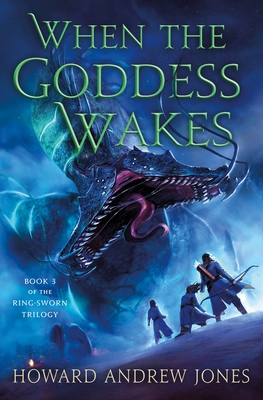 When the Goddess Wakes (The Ring-Sworn Trilogy, #3) by
When the Goddess Wakes (The Ring-Sworn Trilogy, #3) by 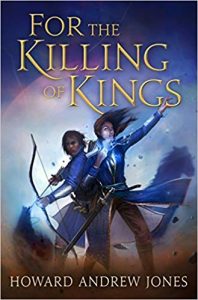 In other words, the ending of
In other words, the ending of 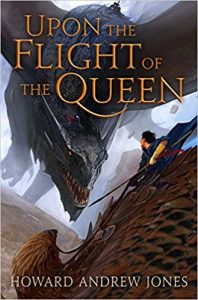 The enemy of my enemy may not exactly be my friend, but when my enemy plans to destroy the entire world including both the enemy of my enemy and myself – and every other person, animal, place and thing in that entire world, the enemy of my enemy and I – or in this case the Altenerai, and the Naor, are more or less united in the face of the alternative.
The enemy of my enemy may not exactly be my friend, but when my enemy plans to destroy the entire world including both the enemy of my enemy and myself – and every other person, animal, place and thing in that entire world, the enemy of my enemy and I – or in this case the Altenerai, and the Naor, are more or less united in the face of the alternative.